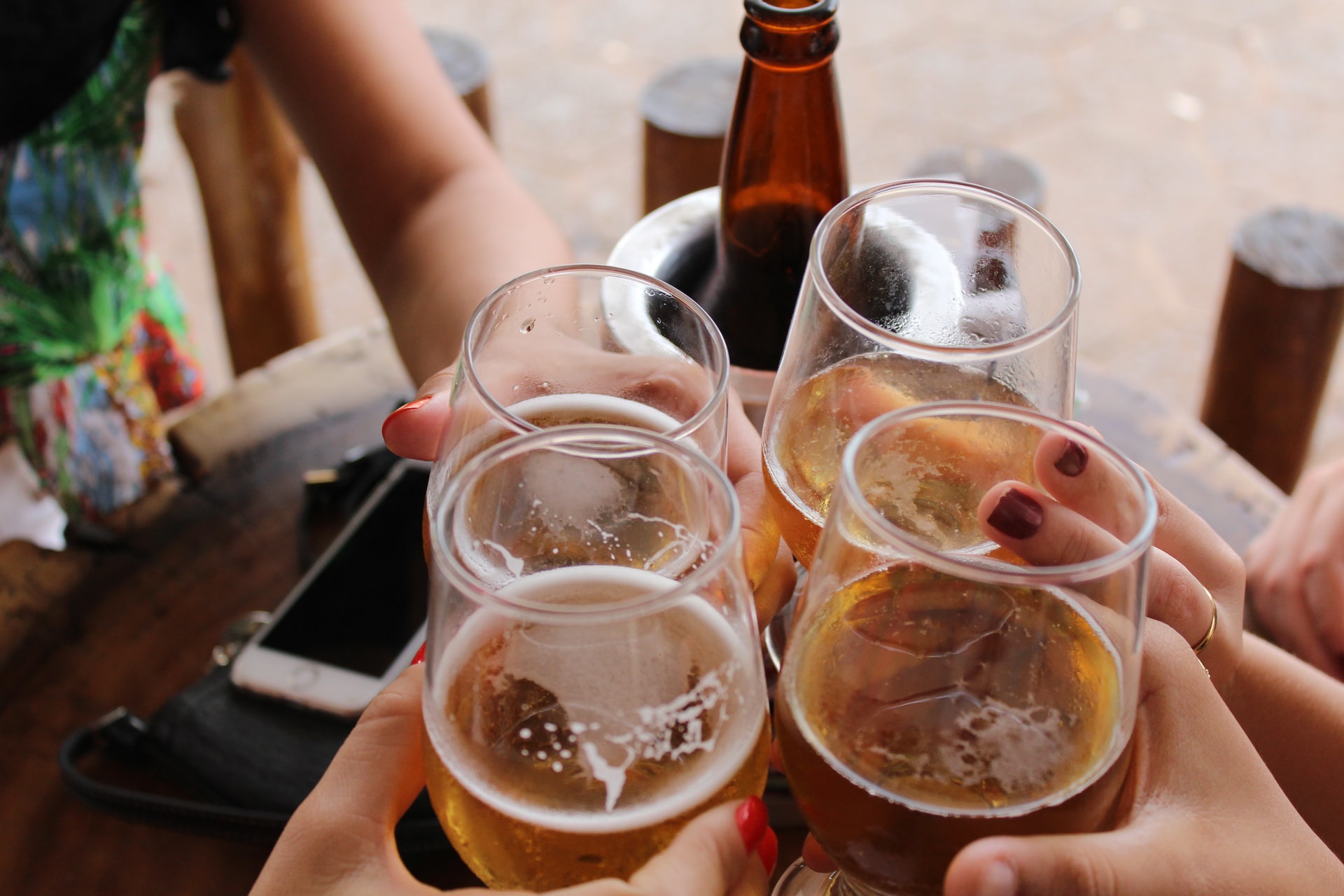Although sources state that only 10 percent of the population have tonsil stones, they may remain hidden or unreported, making the percentage more likely to be far higher. While there are several contributing factors in the formation of tonsil stones, people often overlook alcohol as a primary cause.
have tonsil stones, they may remain hidden or unreported, making the percentage more likely to be far higher. While there are several contributing factors in the formation of tonsil stones, people often overlook alcohol as a primary cause.
Alcohol affects the formation of tonsil stones by disturbing the oral microbiome, increasing biofilm formation, and lowering bacterial diversity. Alcohol also causes dry mouth which enhances debris collection inside the tonsil crypts. Alcohol abuse may lead to poor diet and negligence of dental health too.
If you suffer from tonsil stones, you may wonder how drinking alcohol may contribute to this uncomfortable condition. In this article, I’ll cover some primary reasons why alcohol may be behind those unsightly deposits in your tonsils.
What Are Tonsil Stones (A Brief Overview)
Tonsil stones or tonsilloliths occur when debris such as food particles, mucus, and saliva collects in the crevices or ‘crypts’ of your tonsil tissue. The accumulated debris attracts viral and bacterial action and calcifies or hardens over time, forming a tonsil stone.
Modern studies reveal that tonsils stones aren’t inert but form part of a community of microorganisms called a biofilm. Biofilms may be resistant to antimicrobial agents and harbor harmful organisms that are a source of recurring infection. This resistance makes the treatment of severe tonsil stones challenging and often unsuccessful, barring surgery.
reveal that tonsils stones aren’t inert but form part of a community of microorganisms called a biofilm. Biofilms may be resistant to antimicrobial agents and harbor harmful organisms that are a source of recurring infection. This resistance makes the treatment of severe tonsil stones challenging and often unsuccessful, barring surgery.
But that doesn’t mean surgery should be your first option (check out my article on why you may not want to get a tonsillectomy for tonsil stones).
Tonsil stones may be harmless, although they have unpleasant side effects, such as bad breath. The bacteria that thrive in the tonsil stone release volatile sulfur compounds associated with chronic bad breath or halitosis.
Moderate cases may be treated with dietary changes and self-care. More severe cases may lead to pain, inflammation, and difficulty in swallowing and require medical intervention.
How Does Alcohol Affect The Formation of Tonsil Stones?
Alcohol has multiple effects on the healthy functioning of the human body as well as the oral cavity. Alcohol may disturb the delicate balance of good and bad bacteria in the mouth and cause certain physiological reactions that make you more prone to tonsil stones.
The most important factors of alcohol use and the formation of tonsilloliths are the following:
Alcohol and Its Effects on the Oral Microbiome
Your oral microbiome is a collection of multi-species microorganisms that live together in an ecosystem within the oral cavity. Microbial communities such as the microbiome found in the mouth play a vital role in immune function as well as detoxification of environmental chemicals.
is a collection of multi-species microorganisms that live together in an ecosystem within the oral cavity. Microbial communities such as the microbiome found in the mouth play a vital role in immune function as well as detoxification of environmental chemicals.
When your mouth is healthy, these microorganisms exist in a state of equilibrium, but certain habits such as alcohol consumption may throw it into a state of imbalance. Clinical studies link the oral microbiome to the production of acetaldehyde in high alcohol consumption. Acetaldehyde has been linked to cancer formation as it reacts with DNA, leading to mutations and potential cancer development. 
In a healthy individual, these communal populations of microorganisms protect us from pathogenic species entering the mouth and adhering to the mouth’s mucosa (moist inner lining). If your oral biome is compromised, pathogens may enter the oral cavity and cause disease and poor oral health conducive to conditions such as tonsil stone formation.
Alcohol and Biofilm Formation
In a 2015 clinical study , researchers found that ethanol increased biofilm formation in all six strains of Staphylococcus epidermidis and Staphylococcus aureus. These bacteria are common pathogens involved in negative biofilm development.
, researchers found that ethanol increased biofilm formation in all six strains of Staphylococcus epidermidis and Staphylococcus aureus. These bacteria are common pathogens involved in negative biofilm development. As another clinical study suggests, biofilm establishment is an important event in tonsillolith formation in the tonsillar crypt or crevices.
As another clinical study suggests, biofilm establishment is an important event in tonsillolith formation in the tonsillar crypt or crevices.
Oral Biofilms form when free-floating bacteria adhere to the moist surface of the oral cavity by secreting a glue-like substance, where over time, they form a community of organisms held together by a substance that protects the community from host defenses and the effects of treatment such as antibiotics.
and the effects of treatment such as antibiotics.
Alcohol and Bacterial Diversity
In a 2014 clinical study, researchers found a direct causal link between alcohol use and the reduction of bacterial diversity. The human mouth is alive with microorganisms such as:
- Bacteria
- Archaea
- Fungi
- Viruses
In a healthy mouth, there exists a richness and diversity of these microorganisms that keep harmful bacteria in check and prevent oral disease. Studies show that the human mouth that harbors disease has a lowered diversity with implications for forming conditions such as tonsil stones.
Alcohol and tobacco use lead to biofilms becoming homogenous in their composition, with consequences for the prevalence of human oral disease.  Ethanol in the mouth destroys good bacteria and leaves the more harmful bacteria intact
Ethanol in the mouth destroys good bacteria and leaves the more harmful bacteria intact , often the bacteria found in tonsil stone formation.
, often the bacteria found in tonsil stone formation.
Alcohol and Dry Mouth
Studies have linked chronic alcohol consumption with decreased salivary flow, including salivary metabolism and secretion. Alcohol consumption reduces saliva’s ability to neutralize acids and increases consumption of sweet nonalcoholic drinks. The combination of the effects leads to compromised oral health in general.
Alcohol is a diuretic, which means that it increases urination and may lead to dehydration and a dry mouth. Drying out of the mucosal membranes, in turn, increases the likelihood that debris becomes trapped in the tonsil crypts due to decreased salivary action in dislodging particles of food or mucus.
Alcohol’s drying effect on the mouth and throat contributes to the formation of bacterial layers that may contribute to the calcification of debris in the tonsil crypts. It also increases plaque formation, another form of biofilm similar to tonsil stones, containing more than 500 microorganisms that may trigger disease in the mouth .
.
Alcohol and Poor Dental Hygiene
Alcohol dependents frequently experience dry mouth at night and consume refined carbohydrates more than their non-drinking counterparts. The behavioral patterns of regular drinkers lead to the neglect of both personal and professional oral care . This increases the likelihood of tonsil stone formation.
. This increases the likelihood of tonsil stone formation.
Poor dental hygiene may contribute to the incidence of tonsil stones, although some patients may still develop tonsil stones while maintaining good dental hygiene. In these cases I recommend using natural remedies for removing tonsil stones on a regular basis.
However, it’s a proven fact that tonsil stones primarily consist of accumulated debris in the tonsil cavities. So, regular flossing, brushing, and tongue cleaning reduces debris accumulation that leads to stone formation. For more info, check out my post on the best tonsil stone removal tools.
For more info, check out my post on the best tonsil stone removal tools.
How Much Alcohol Causes Oral Disease?

The Centers for Disease Control and Prevention (CDC)  offer guidelines regarding moderate and excessive alcohol consumption. Their standard drink unit guidelines are 14.0 grams or 0.6 ounces of pure alcohol. This unit equates to roughly:
offer guidelines regarding moderate and excessive alcohol consumption. Their standard drink unit guidelines are 14.0 grams or 0.6 ounces of pure alcohol. This unit equates to roughly:
- 1.5 ounces of 40% alcohol-based spirits or liquor or (44 ml.)
- 15 ounces of beer at 5% alcohol (443 ml.)
- 5 ounces wine at 12% alcohol (147 ml.)
The CDC rates alcohol consumption along with the following guidelines:
- Moderate drinking: Limiting your drinks to less than two units per day for men, and 1 for women
- Heavy drinking: For men, the consumption of 15 units of drink per week or more is considered heavy drinking. According to the CDC, women who consume 8 units or more are heavy drinkers.
- Binge drinking: Binge drinking is episodes that bring a person’s blood alcohol content up to 0.08% or above within an average of 2 hours. For men, this involves 5 drinks or over, and for women, 4 drinks.
Final Thoughts
The World Health Organization  lists alcohol as one of the primary causes of oral disease, including periodontal disease and oral cancer. Alcohol certainly contributes to tonsil stones, and reducing and eliminating alcohol may prevent or manage tonsil stones. It will also have multiple beneficial effects on your overall physical health.
lists alcohol as one of the primary causes of oral disease, including periodontal disease and oral cancer. Alcohol certainly contributes to tonsil stones, and reducing and eliminating alcohol may prevent or manage tonsil stones. It will also have multiple beneficial effects on your overall physical health.
If you have tonsil stones, speak to your health care provider for more advice. Quitting alcohol may not be enough to reverse the progression of the condition.
Also, check out the rest of my blog for more info on living a life without tonsil stones.


